You are here
Events
| Title | Date | Author | Time | Event | Body | Research Area | Topics | File attachments | Image |
|---|---|---|---|---|---|---|---|---|---|
| Indian Parliament and Sino-Indian Relations | December 03, 2010 | R N Das | Fellows' Seminar |
Chair: Prof. V P Dutt The paper argued that the role of parliament in Sino-Indian relations can be assessed under following heads: debates on Addresses by President of India to joint sessions of Parliament, ‘demands for grants’, Annual Report of Ministries, motions and resolutions, statements, questions, etc. In addition, the role of standing committees, particularly on defence and external affairs, and of the parliamentary consultative committees, as well as exchange of parliamentary delegations and Parliamentary Friendship Groups can also be highlighted as providing a comprehensive picture of the role of the Indian Parliament so far as India-China relationship is concerned. Sino-Indian relations have figured and at times have drawn the attention of both the Houses of parliament. When we talk about Indian Parliament and Sino-Indian relations, perhaps the role of political parties also figures automatically; after all, parliament and political parties are intertwined. The role of the Indian parliament in Sino-Indian relations predates even the Independence of the country and can be traced to the Provisional parliament called the Constituent assembly (Legislative) and that of the political parties, particularly the Congress party, and even prior to that when Nehru sent a medical mission led by Mohanlal Atal which included the legendary Dr. Dwarkanath Kotnis at a time when China was fighting Japan. Debates on foreign policy enable the government to demonstrate that Indian democracy works, educate the electorate, and legitimise the foreign policy. Parliamentary debates, while often eloquent and lively, merely serve to keep ministers vigilant, but do not alter policy because they usually follow, rather than precede, governmental policy actions. However, at times of crises, Parliament rises to the occasion by playing a significant role in foreign policy making. As far as India’s relationship with China is concerned, there is a degree of consensus among political parties. While the CPM has been sympathetic to China, Socialists like George Fernandes and Mulayam Singh Yadav have been critical of China. But among major political parties there is a broad consensus. Secondly, the role of parliament is minimized since the nature and structure of foreign policy making in a parliamentary polity is often characterized by a degree of secrecy considering its sensitive and strategic nature. Thirdly, as far as Sino-Indian relationship is concerned, South Block at times is not inclined to leave much space for other stake holders including the Parliament for the very reasons mentioned above. These are some of the inherent limitations while working on a project like assessing the role of parliament in Sino-Indian relations. Nevertheless, parliament continues to be the fulcrum of the legislative and policy-making process and it is the pivotal institution through which omissions and commissions of the government are accounted for. Amb. Bhutani highlighted the procedures which parliament employs while discussing foreign policy issues. He also showed that in the initial years foreign policy had an economic dimension. For example, when Prime Minister Nehru wanted to establish land cooperatives it was not received positively because people thought that he wanted to follow the Chinese or the Soviet model. In that sense, economic policy was seen as intimately linked with foreign policy. On the other hand, parliamentary debates on the Tibet/China issue were resented by Beijing. It felt that New Delhi had no right to discuss matters pertaining to Chinese domestic issues and saw it as Indian interference in China’s domestic affairs. Meanwhile Nehru had to let the debates go on since they served as a safety valve when emotions were running high within India after the ‘liberation’ of Tibet by the People’s Republic. As a result of these debates China condemned India as well as the Dalai Lama. Prof. Sumit Ganguly highlighted the fact that the paper attempts to cover a large gamut of issues and it should try and focus on one or at the maximum two time periods. As the area which is being covered is huge the debates appear to be moving from one topic to another. He also said that there is a need to show that Nehru’s understanding on China was not that nuanced and he was not clear about his stance throughout. He also asserted that the Parliament needs to take a stronger stance on current issues. He stated that Parliament needs to follow what are the outcomes of the scheduled meetings to discuss the border problem and what is the progress being made as a result of these meetings. Some other points that were highlighted during the discussion include the comment that paper gave the impression that only Congress members took part in active discussions. There were also suggestions that the author can simply limit his focus on the Indian parliament’s role when it comes to the Tibet issue since in any event the border issue is related to it. In his concluding remarks, Prof. Dutt stated that Parliament becomes very important in times of crises. He also said that Dalai Lama’s flight and its ramifications have not been included in the paper. He suggested that if the author refers to the Parliament papers and discussions it will add more depth to the argument of the paper. Report prepared by Gunjan Singh, Research Assistant, Institute for Defence Studies and Analyses, New Delhi. |
East Asia | ||||
| Inaugural Y.B. Chavan Memorial Lecture - The Great Power Game : India in the New World | November 22, 2010 | 1630 hrs | Speeches and Lectures |
Speaker: Dr Sunil Khilnani, Starr Foundation Professor, Director of the South Asia Studies Program at the Paul H Nitze School of Advanced International Studies, John Hopkins University Programme1630 – 1635: Welcome Address by DG 1635 – 1640: Address by Shri K Subrahmanyam 1640 – 1645: Address by representative of Yashwantrao Chavan Pratishthan Mumbai 1645 – 1730: Talk by Prof Sunil Khilnani on “The Great Power Game : India in the New World” 1730 – 1800: Question and Answer Session. Refreshments |
|||||
| Special Address - 45th IDSA Foundation Day Lecture | November 11, 2010 | 1100 hrs | Speeches and Lectures |
Venue: IDSA Auditorium Shri A K Antony, Hon’ble Raksha Mantri & President IDSA will deliver the Presidential Address & Present Awards Dr Kaushik Basu, Chief Economic Adviser, Government of India will deliver the Foundation Day Lecture on Game Theory and Strategic Foreign Policy Programme1100 hrs: Arrival of Hon’ble Raksha Mantri and President, IDSA 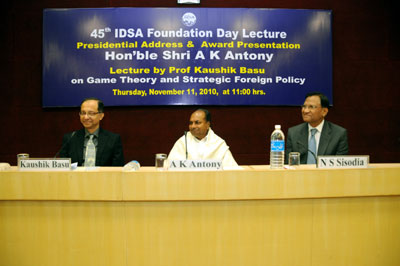 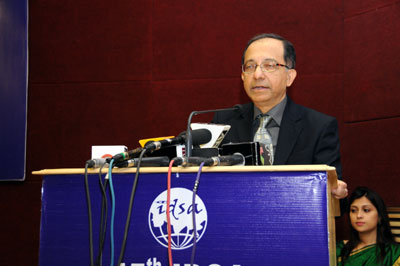 Dr. Kaushik Basu giving Foundation Day Lecture 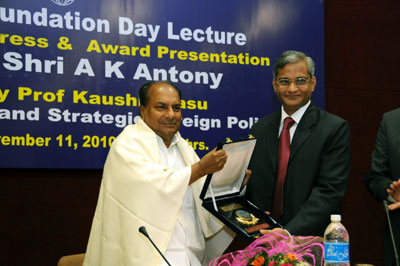 Shri A K Antony, Hon’ble Raksha Mantri presenting K Subrahmanyam Award to Dr Srikanth Kondapalli 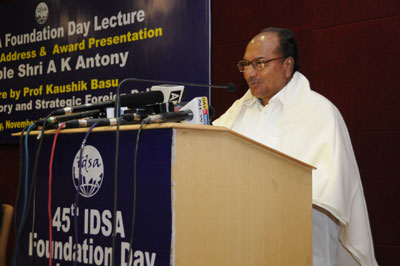 Shri A K Antony, Hon’ble Raksha Mantri giving Presidential address 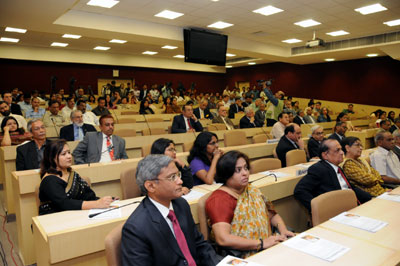 |
|||||
| Why Transnational Energy Pipelines Remain Pipedreams in South Asia | November 19, 2010 | Shebonti Ray Dadwal | 1000 to 1230 hrs | Fellows' Seminar |
Chairperson: Prof. Sujit Dutta
|
Non-Traditional Security | |||
| Special Address - Trends in globalization with a special focus on India | October 26, 2010 | 1315 to 1415 hrs | Speeches and Lectures |
Venue: Seminar Hall No 1, IDSA
|
|||||
| Special Address - Professor Stephen Cohen on Obama’s South Asia Policy | October 29, 2010 | Speeches and Lectures |
At the outset, Professor Cohen predicted continued progress of US-India relations regardless of the outcome of high-level visits. He reviewed the range of reactions elicited by the Indo-US nuclear deal – both favourable and less so – within the United States, deeming as legitimate concerns over some of the associated proliferation implications. He went on to add, however, that India’s impeccable democratic credentials had gone a long way to facilitate ultimate consensus over the deal. Regarding immediate priority ranking of the Obama Administration’s foreign policy, however, he rated India below Afghanistan and Pakistan. Vis-à-vis China, the US and India have both adopted a wait-and-see policy, but this, according to Professor Cohen, has only further strengthened the basis for a meaningful partnership between the two democracies. On the question of Afghanistan, he came out in support of revival of the Bonn Agreement as a way to successfully combat radicalization. Given the shared stakes India and Pakistan have in a stable, moderate Afghanistan, he expressed hope for close cooperation between the two nations. Regarding American involvement in the region, he identified facilitation of Indo-Pak rapprochement and better relations with Iran as deserving consistent effort. A member of the audience called into question the idea that India and Pakistan shared interests in Afghanistan, in response to which Professor Cohen suggested that radicalization of Afghanistan being detrimental to both actors, a distinction needs to be drawn between interest and policy. Responding to another question, he characterized a Pakistan riddled with uncertainty as worrisome to the US and candidly admitted that its weaknesses sometimes played out in its favour. Professor Cohen held India partly responsible as far as the closeness of China Pakistan relations is concerned. In answer to a query related to American assistance to Pakistan, Professor Cohen acknowledged the possibility of diversion of funds to the Taliban, yet argued that this was an inevitable fall-out if Chinese influence over Pakistan were to be held in check. He went on to suggest that the American dilemma vis-à-vis Pakistan was not too different from the Indian one, as the outcomes of a more aggressive stance against Pakistan were far from clear. Support to radical groups by the Pakistani ISI was seen – albeit ill-judged – as historically a widely employed instrument of statecraft. Professor Cohen’s assessment of Indo-US relations over the long-run was that the initiative lies with India on most outstanding issues. In the Chair’s summary, Mr. K. Subrahmanyam argued that the tipping point for Pakistan would be triggered by internal constituencies reacting to American intervention in tribal areas. He predicted decline in American financial support to Pakistan pending decisive action on the latter’s part to counter radical groups. He portrayed India as the default partner for a US attempting to win the “knowledge race” and maintain it’s pre-eminence. Report prepared by Kalyani Unkule, Research Assistant, Institute for Defence Studies and Analyses, New Delhi. |
||||||
| Special Address - US-India Strategic Partnership: What Lies Ahead | October 22, 2010 | 1030 to 1200 hrs | Special Address |
Venue: IDSA Seminar Hall-I |
North American | ||||
| China’s Defence Diplomacy in Southeast Asia | December 30, 2010 | Pankaj K Jha | 1030 to 1300 hrs | Fellows' Seminar |
Chairperson: Amb. TCA Ragachari
|
East Asia | |||
| What should be India's strategic response to insurgency and terrorism? | October 06, 2010 | 1000 hrs | Round Table |
ProgrammeCountering ideological narratives: Strategic Response to LWE Countering ethnic narratives: Strategic Response to insurgencies in the Northeast Religion, Secessionism & Cross border linkages: Responding to insurgency in Jammu and Kashmir Systemic reforms- police, intelligence, governance – Download Concept Note |
Terrorism & Internal Security | ||||
| India, Pakistan and the Bomb: Debating Nuclear Stability in South Asia | September 20, 2010 | 1500 hrs | Book Release |
IDSA is organising a Book Release titled ”India, Pakistan and the Bomb: Debating Nuclear Stability in South Asia” authored by Professor Sumit Ganguly. The book will be released at 1500 hrs on Monday, 20 September 2010 in IDSA Seminar Hall I. The book release will be followed by a panel discussion by Brig. Gurmeet Kanwal, Prof. Amitabh Matto and Prof. Kanti Bajpai. |


